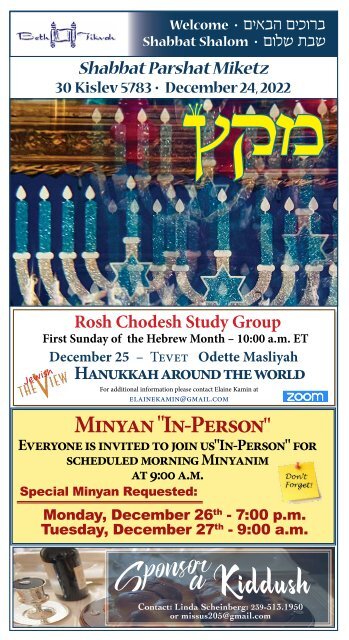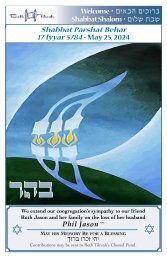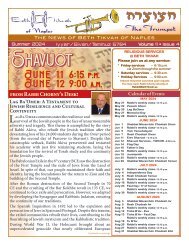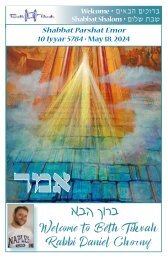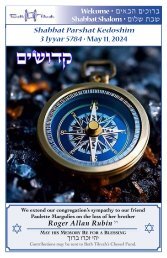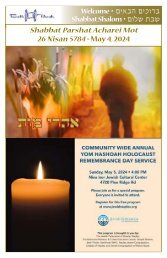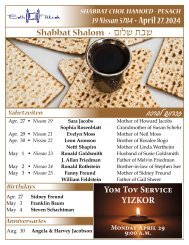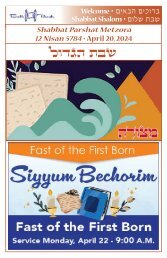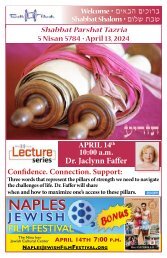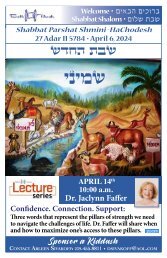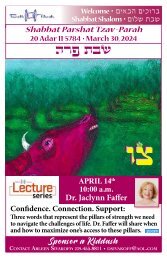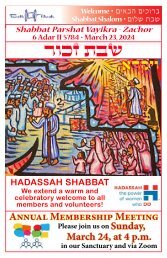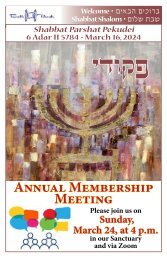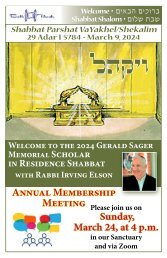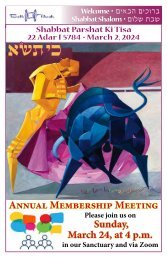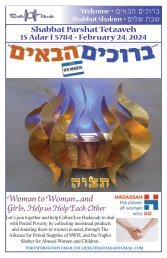You also want an ePaper? Increase the reach of your titles
YUMPU automatically turns print PDFs into web optimized ePapers that Google loves.
Welcome • ohtcv ohfurc<br />
Shabbat Shalom • ouka ,ca<br />
Shabbat Parshat Miketz<br />
30 Kislev 5783 • December 24, 2022<br />
/qm<br />
Rosh Chodesh Study Group<br />
First Sunday of the Hebrew Month – 10:00 a.m. ET<br />
December 25 – Tevet Odette Masliyah<br />
Hanukkah around the world<br />
For additional information please contact Elaine Kamin at<br />
elainekamin@gmail.com<br />
Minyan "In-Person"<br />
Everyone is invited to join us"In-Person" for<br />
scheduled morning Minyanim<br />
at 9:00 a.m.<br />
Special Minyan Requested:<br />
Monday, December 26 th - 7:00 p.m.<br />
Tuesday, December 27 th - 9:00 a.m.<br />
Sponsor a<br />
Kiddush<br />
Contact: Linda Scheinberg: 239-513.1950<br />
or missus205@gmail.com
Yahrtzeiten<br />
Dec 23 • Kislev 29 Jennie Hecht – Mother-in-law of Arnold Bresnick<br />
Max Lipnick – Father-in-law of Judith Lipnick<br />
Dec 27 • Tevet 3 Reeta Greenstein – Mother of Elise Vall<br />
Sol Danoff – Father of David Danoff<br />
Irene Goodman – Mother of Bob Goodman<br />
Dec 28 • Tevet 4 Laila Treadwell – Sister-in-law of Norma Rosen<br />
Jack Schwartz – Father of Elliot Schwartz<br />
Dec 29 • Tevet 5 Philip Fant – Father of Ray Fant<br />
Birthdays<br />
Dec 25<br />
Dec 30<br />
Aniversaries<br />
Aviva Chorny, Phil Jason, Ronda Amar<br />
Janet Cohen, Larry Hecht, Paul Kardon, Kate Prizel<br />
Dec 23 Arlene & Mark Litow (43)<br />
Dec 27 Jaclynn Faffer & Leonard Silverstein (36)<br />
Dec 28 Heidi & Howard Gilbert (56)<br />
Kiddush Sponsor<br />
Ed & Paulette Margulies,<br />
in honor of Ed’s chanting the Haftarah<br />
MAVENS:<br />
Shelley Goodman & Evelyn Hecht<br />
HELPERS:<br />
Belle Agronin, Beverly Blazar, Rosalee Bogo,<br />
Joe & Sue Hammerman, Paulette Margulies, Roberta Miller,<br />
Linda & Shep Scheinberg & Joyce Toub<br />
Sponsor a kiddush, contact Linda Scheinberg<br />
missus205@gmail.com<br />
Torah & Haftarah Readings:<br />
Parshat Miketz: Genesis 41:1-52 (Etz Hayim p. ---)<br />
1. 37:1-3 2. 37:4-7 3. 37:8-11<br />
4. 37:12-17<br />
5. 37:18-22 6. 37:23-28 7. 37:29-36 M. 40:20-23 (p. ---)<br />
Haftarah: Zechariah 2:14-4:7 (p. ---)<br />
Torah / Haftarah Summary<br />
Commentary:<br />
The First Halakhic Change in History – Jushua Kulp<br />
Although we’re not reading from the books of the Maccabees in<br />
our synagogues, my column this week will focus on this book and an<br />
important halakhic episode that is a crucial part of the story.<br />
In Maccabees I chapter 2, Mattityahu sets off the revolt in Modiin (my<br />
home city) by refusing to sacrifice to pagan gods and then killing a Jew<br />
who did. Pursued by Greek soldiers, Mattityahu’s followers are forced
to flee. Hiding in caves, they refuse to come out and obey the king’s<br />
command. In response, we read in verses 35-37, “The soldiers attacked<br />
them immediately, but the Jews did nothing to resist; they did not<br />
even throw stones or block the entrances to the caves where they were<br />
hiding. They said, ‘We will all die with a clear conscience. Let heaven<br />
and earth bear witness that you are slaughtering us unjustly.’ So the<br />
enemy attacked them on the Sabbath and killed the men, their wives,<br />
their children, and their livestock. A thousand people died.” It is unclear<br />
whether or not the Greeks knew that the Jews would not fight back on<br />
Shabbat, but one can only imagine that once it was clear that they would<br />
not, the Greeks now had an easy way to defeat the rebels.<br />
Mattityahu and his followers had a choice: They could fight on Shabbat<br />
and attempt to overthrow their Greek enemies, or die as martyrs for<br />
their cause. They chose the former. “When Mattityahu and his friends<br />
heard the news about this, they were greatly saddened and said to one<br />
another, ‘If all of us do as these other Jews have done and refuse to<br />
fight the Gentiles to defend our lives and our religion, we will soon be<br />
wiped off the face of the earth.’ On that day they decided that if anyone<br />
attacked them on the Sabbath, they would defend themselves, so that<br />
they would not all die as other Jews had died in the caves.” Mattityahu’s<br />
decision allowed them to fight the next Shabbat, eventually overthrow<br />
their Greek enemies and purify the defiled Temple. So powerful was<br />
their decision that it was really not questioned for the rest of Jewish<br />
history. In Hebrew we say, ",cav ,t vjus apb juehp"-- “Saving a life<br />
overrides the Shabbat.”<br />
But there is more to the story. The Book of Maccabees is not just a<br />
recording of historical facts. Like all books in the ancient world, it shapes<br />
its tale to convey a pedagogical message to the reader. The author here<br />
has carved out a careful message concerning which battles are worth<br />
dying for and which are not. When the Greeks command the Jews to<br />
offer foreign sacrifices or to eat pig (as we find in the tale of the seven<br />
sons in Maccabees II), Jews lay down their lives and are praised for doing<br />
so. Life is of course an important value, but the struggle to physically<br />
survive does not take precedence when one’s entire way of living is<br />
threatened. Abrogating the prohibition of idolatry or the dietary rules<br />
at the command of the king are instances in which the Greeks were<br />
attempting to destroy Judaism itself. As such, the editors of these books<br />
advocate for martyrdom. However, the case of fighting on Shabbat is<br />
different. The Greeks were not commanding the Jews to break Shabbat.<br />
They were simply taking advantage of the Jewish reticence to fight on<br />
Shabbat. This was not a case of “martyrdom”--demonstrating one’s<br />
fealty to God at the cost of death. At certain times, commandments<br />
must be broken in order to achieve the higher goal of preservation of life<br />
and the Jewish people.
Following the precedent of the Maccabees, the rabbis were adamant that<br />
“pikuach nefesh” the saving of life, overrides the commandment to keep<br />
Shabbat – but only when it is not done as part of religious persecution<br />
(see Bavli Sanhedrin 74a; Maimonides, Foundations of the Torah 5:1-2). Today,<br />
Shabbat is routinely violated in hospitals throughout the Jewish world.<br />
Indeed in any case where there is even a potential threat to life, not<br />
only may Shabbat be violated, but it must be violated. The Israeli army<br />
violates Shabbat in order to protect its citizens. Today we take this for<br />
granted, but we can look back to Mattityahu and his embattled partners<br />
and thank them for this remarkable innovation–life is a more important<br />
value in Judaism than (almost) any particular commandment.<br />
Gerald Sager Memorial Scholar–In–Residence Series<br />
During the weekend of January 13 th & 14 th<br />
Mr. Bernard Lubran will share his expertise about:<br />
The Ritchie Boys of World War II<br />
as our first Scholar-in-Residence of the Season<br />
In anticipation of this important program, a special<br />
documentary will be screened in advance on Sunday<br />
afternoon, January 8 th at 4:00 p.m. at Beth Tikvah.<br />
For a complete description of the event, please visit the synagogue website.<br />
BOOK DISCUSSION WITH ARLENE SOBOL<br />
READ WITH US.<br />
THURSDAY<br />
JANUARY 19 th - 10:00 a.m.<br />
Set in an upper-middle-class Tel Aviv apartment building,<br />
this best-selling and acclaimed Israeli novel examines the<br />
interconnected lives of its residents, whose turmoils, secrets,<br />
unreliable confessions, and problematic decisions reveal a<br />
society in the midst of an identity crisis.<br />
The book is available at a considerable discount at<br />
Join Rabbi Chorny<br />
for his weekly discussion<br />
group, Tuesdays at<br />
12:15 p.m. via<br />
Beth Tikvah of Naples<br />
1459 Pine Ridge Road<br />
Naples, FL 34109<br />
(239) 434-1818<br />
Visit us online at<br />
bethtikvahnaples.org<br />
or scan the QR code<br />
to go there directly


